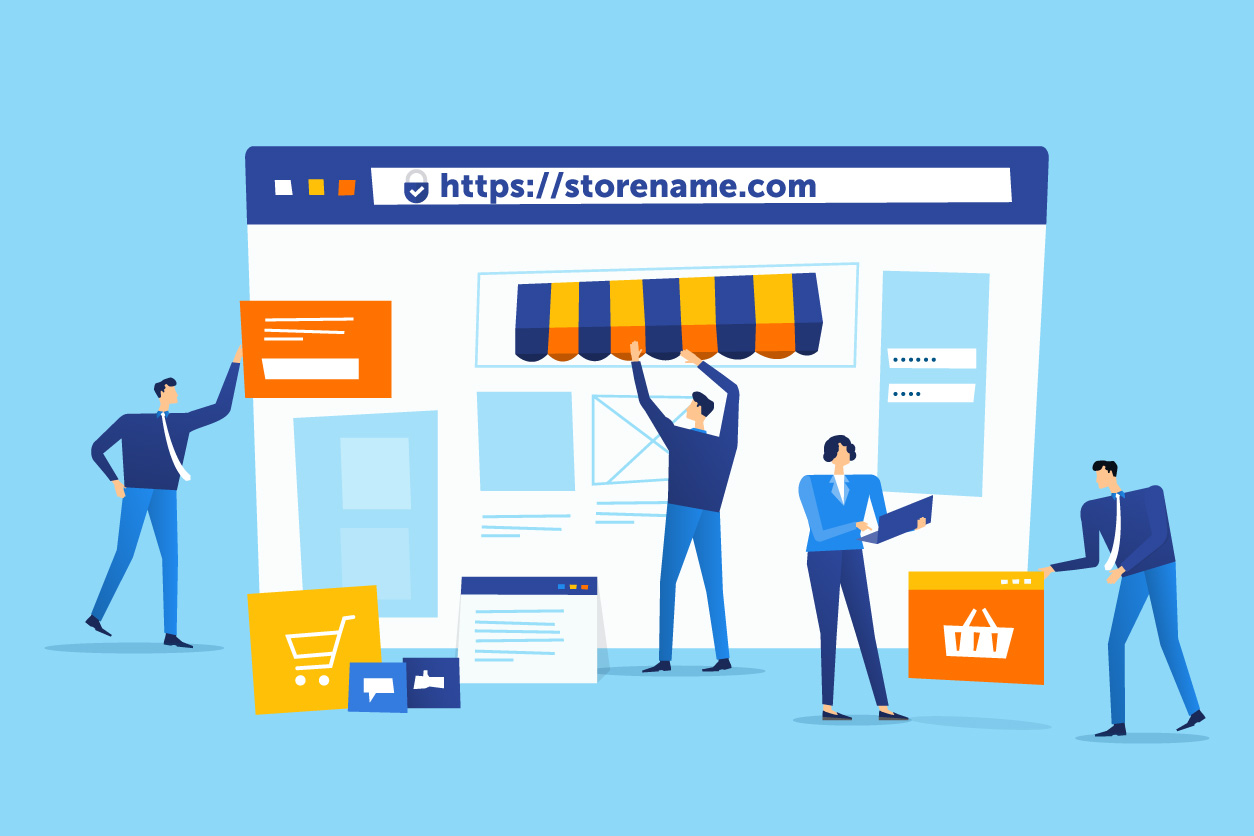On the verge of 2024, web development companies and industries across e-commerce will embark upon an epic transformational journey driven by the technological innovations of tomorrow as well as consumer expectations of today. Digital landscapes continue to change quickly – 2024 promises many trends that could alter how businesses engage their audience.
Ecommerce website development industries strive to offer engaging, tailored experiences. These trends reflect this commitment. The upcoming e-commerce web development trends will shape online retail’s future. They include incorporating advanced technologies like augmented reality, artificial intelligence, and mobile commerce.
To remain competitive in 2024’s rapidly shifting e-commerce landscape, businesses must anticipate current and emerging trends. They must adopt them to deliver an enjoyable shopping experience and superior customer service.
Upcoming Trends of Ecommerce Website Development in 2024
Here are some trends to come that will change how businesses interact with customers and operate online.
Augmented Reality (AR) Integration
By 2024, it is anticipated that the integration of AR into ecommerce sites will gain significant momentum. AR improves online shopping by enabling users to see products before purchasing. The technology helps to reduce uncertainties about size, style, and color. This increases consumer confidence, diminishing returns.
Voice Commerce
Voice commerce will increasingly dominate ecommerce in 2019 due to smart speakers and virtual assistants becoming mainstream. Voice search will be a crucial feature of ecommerce sites, as they need to ensure that voice-activated devices can easily find product listings. Natural language processing and conversational interfaces will be essential to facilitate voice-based transactions.
Personalization powered by AI
AI-driven personalized shopping will reach new levels in 2024. Ecommerce sites will use machine learning algorithms to analyze the user’s behavior, preferences, and past purchases to provide highly customized shopping experiences. AI, from product recommendations to customized marketing messages, will allow online retailers to offer each customer a more personalized and engaging journey.
Blockchain for Secure Transactions
The ecommerce industry is increasingly adopting blockchain technology due to its capacity to improve security and transaction transparency. By 2024, more ecommerce sites will likely adopt blockchain technology for supply chain management and fraud prevention. The decentralized technology is tamper-resistant and increases trust among buyers and sellers on the internet marketplace.
Progressive Web Apps
Progressive Web Apps will be common in developing e-commerce websites by 2024. They offer an app-like user experience in a browser. PWAs are known for fast loading, seamless experiences, and offline functionality. They are an excellent choice for sites that want optimal device performance.
Subscription-based Models and Services
Subscription-based business models are becoming more popular in ecommerce to encourage customer loyalty. They also provide predictable revenue streams. We can anticipate a boom in subscription-based ecommerce services by 2024. This could be for exclusive content or access to premium features. The model is not just beneficial to consumers, but it also gives businesses a stable income as well as the opportunity to develop long-term customer relationships.
Sustainability Integration
Ecommerce website development services are expected to place a higher priority on sustainability as environmental awareness grows. Ecommerce platforms should emphasize ecological responsibility through various strategies, from eco-friendly packaging to supporting sustainable products. This trend meets consumer preferences and contributes to society-wide efforts toward eco-conscious consumption.
Mobile-First Approach with 5G
In 2024, the introduction of 5G will make a mobile-first approach even more important for ecommerce sites. Online retailers will be encouraged to optimize their platforms for mobile devices with faster internet speeds and reduced latency. Mobile usability is a priority, from responsive design to mobile payment methods.
Social Commerce Evolution
In the future, social commerce will be an integral component of ecommerce. By 2024, social media and e-commerce platforms will be integrated to provide seamless experiences within apps. In-app checkout and shoppable posts will be standard features, blurring the lines between online shopping and social media.
Cybersecurity Prioritization
2024 will mark an increase in cybersecurity initiatives at online commerce sites due to growing cyber threats. Protecting customer information remains of utmost importance. This includes secure payment gateways and robust data encryption. Ecommerce platforms invest in the latest security protocols and update their systems regularly to keep up with emerging threats.
Key Benefits of E-commerce Website Development
The key benefits and contributions of an e-commerce site to business success are listed below:
Global Reach & Market Expansion
E-commerce sites have the advantage of being able to reach an international audience. Online stores can transcend geographical limitations that limit traditional brick-and-mortar shops. Businesses can expand their customer reach worldwide with an ecommerce website development company and access new markets more effectively.
24/7 Accessibility and Convenience
E-commerce sites are accessible 24/7, unlike physical shops with set operating hours. It is an incredible convenience that allows users to shop and browse at their own pace. The system’s flexibility is precious to consumers who have busy schedules or are in other time zones. This leads to an increase in customer satisfaction.
Cost Efficiency and Reduced Overheads
The costs of traditional retail are reduced by e-commerce, including rent, utility bills, and store staffing. Online stores are generally cheaper to run, allowing businesses to allocate their resources better. Automating processes from order processing to inventory management reduces manual work and saves money.
Data-Driven Insights and Analytics
Businesses can gain valuable insights and data about customer preferences and behavior from e-commerce platforms. Analytics tools allow businesses to track customer interactions, analyze sales patterns, and collect information on what works. This data-driven method empowers companies to make informed decisions and refine marketing strategies. It also allows them to tailor their products to meet customers’ needs better.
Personalized Shopping Experience
Businesses can personalize shopping experiences for customers using e-commerce sites. Companies can use data analytics to offer targeted messages, personalized discounts, and product recommendations. Customization increases customer satisfaction and brand loyalty. It also encourages repeat purchases.
Improved Customer Engagement and Communication
Platforms for e-commerce provide direct communication channels between companies and their customers. Live chats, newsletters, and integration with social media allow real-time communication. Customers can ask questions, provide feedback, and receive prompt responses to their concerns.
Businesses can build a strong relationship with the audience by addressing customer queries, gathering feedback, and responding promptly. Effective communication fosters trust, which helps establish a positive reputation for your brand.
Flexibility and Scalability
The scalability of e-commerce platforms provides businesses with an effective means of growing and adapting without significant infrastructure changes. Start-ups, as well as established enterprises alike, can utilize them successfully. They allow for growth by adding products, product line expansions, or increased website traffic. Businesses that want to grow their business over time need this flexibility.
Streamlined Inventory Management
Platforms for e-commerce streamline the inventory management process, which reduces the risk of stockouts or overstocking. Automated inventory management systems track stock levels in real-time, update product availability, and send alerts to restock. It not only improves the customer experience but also increases operational efficiency.
Secure Transactions and Payment Options
Modern platforms use robust encryption to safeguard customer data. Secure payment gateways allow customers to shop confidently, knowing their information is safe. Offering customers a range of online payment options, such as credit cards, digital wallets, and other payment methods, increases convenience and expands your customer base.
Marketing and Promotional Opportunities
An Ecommerce website developer provides businesses with an ideal venue for implementing marketing and promotion strategies, from targeted emails and social media ads to other means, such as SEO optimization and email blasts. Online promotions, loyalty programs, and discounts enhance customer retention and acquisition efforts.
Mobile Devices Adaptability
Mobile responsiveness is crucial in developing an e-commerce site due to widespread smartphone use. The responsive design allows the store to adapt seamlessly across devices. Users will enjoy an effortless user experience across desktops, tablet computers, and mobile phones to guarantee an optimal mobile market capture experience. Adaptability will allow businesses to capitalize on the mobile market.
Competitive Edge
A practical and well-designed e-commerce website is essential in today’s business environment, offering consumers convenience when they shop. Businesses need an online presence to retain customers from competitors using such platforms. Investing in this aspect shows innovation and customer focus from management.
Conclusion
In 2024, the trends for e-commerce web development will be radically different. This is a new era of digital retail. The fusion of advanced technologies will reshape online shopping, providing consumers with unprecedented experiences and giving business owners new opportunities.
Integrating artificial intelligence and augmented reality is poised to revolutionize the user experience, allowing for immersive and personal interactions. Soon, 5G will enhance mobile experiences by ensuring seamless and faster transactions. The influence of blockchain on secure transaction and subscription models shows the industry is committed to customer-centricity and innovation.
The emphasis on sustainability also reflects the societal trend towards environmentally-conscious consumerism, aligning E-commerce with responsible business practices. Social commerce is evolving, and voice commerce will gain prominence. The convergence of online shopping and social media will change how consumers find and buy products.
Businesses that can navigate these trends and remain at the forefront of technological advances will be positioned for success in 2024’s dynamic ecommerce environment. As these trends continue shaping the next chapter in e-commerce, there are exciting opportunities for retailers and consumers.



